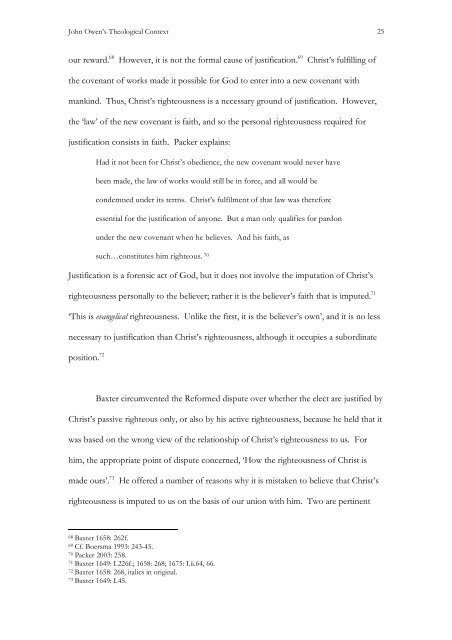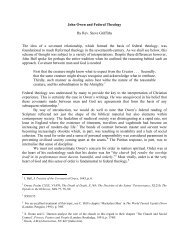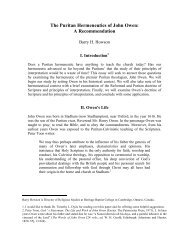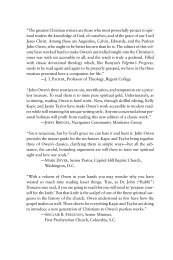M.TH. LONG DISSERTATION (LD6.1) - John Owen
M.TH. LONG DISSERTATION (LD6.1) - John Owen
M.TH. LONG DISSERTATION (LD6.1) - John Owen
Create successful ePaper yourself
Turn your PDF publications into a flip-book with our unique Google optimized e-Paper software.
<strong>John</strong> <strong>Owen</strong>’s Theological Context<br />
our reward. 68 However, it is not the formal cause of justification. 69 Christ’s fulfilling of<br />
the covenant of works made it possible for God to enter into a new covenant with<br />
mankind. Thus, Christ’s righteousness is a necessary ground of justification. However,<br />
the ‘law’ of the new covenant is faith, and so the personal righteousness required for<br />
justification consists in faith. Packer explains:<br />
Had it not been for Christ’s obedience, the new covenant would never have<br />
been made, the law of works would still be in force, and all would be<br />
condemned under its terms. Christ’s fulfilment of that law was therefore<br />
essential for the justification of anyone. But a man only qualifies for pardon<br />
under the new covenant when he believes. And his faith, as<br />
such…constitutes him righteous. 70<br />
Justification is a forensic act of God, but it does not involve the imputation of Christ’s<br />
righteousness personally to the believer; rather it is the believer’s faith that is imputed. 71<br />
‘This is evangelical righteousness. Unlike the first, it is the believer’s own’, and it is no less<br />
necessary to justification than Christ’s righteousness, although it occupies a subordinate<br />
position. 72<br />
Baxter circumvented the Reformed dispute over whether the elect are justified by<br />
Christ’s passive righteous only, or also by his active righteousness, because he held that it<br />
was based on the wrong view of the relationship of Christ’s righteousness to us. For<br />
him, the appropriate point of dispute concerned, ‘How the righteousness of Christ is<br />
made ours’. 73 He offered a number of reasons why it is mistaken to believe that Christ’s<br />
righteousness is imputed to us on the basis of our union with him. Two are pertinent<br />
68 Baxter 1658: 262f.<br />
69 Cf. Boersma 1993: 243-45.<br />
70 Packer 2003: 258.<br />
71 Baxter 1649: I.226f.; 1658: 268; 1675: I.ii.64, 66.<br />
72 Baxter 1658: 268, italics in original.<br />
73 Baxter 1649: I.45.<br />
25





